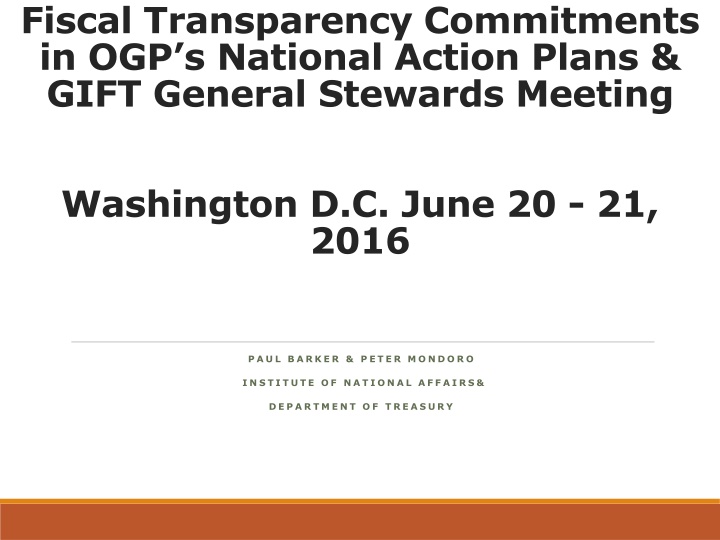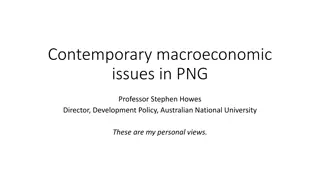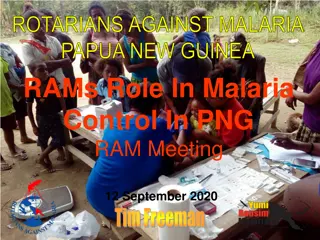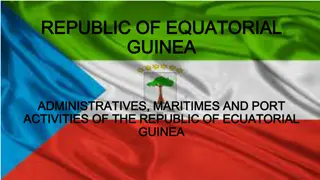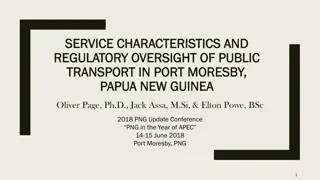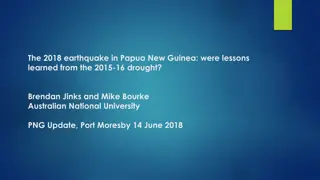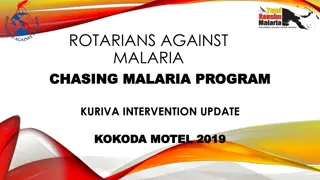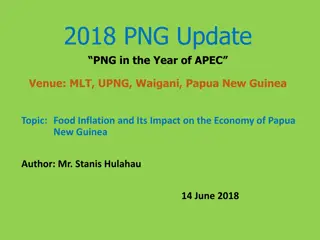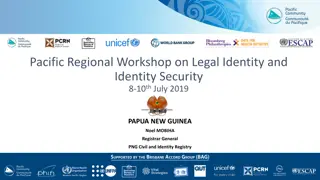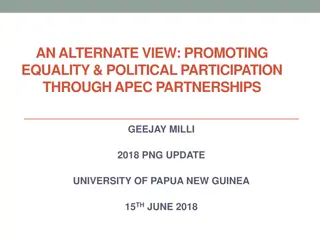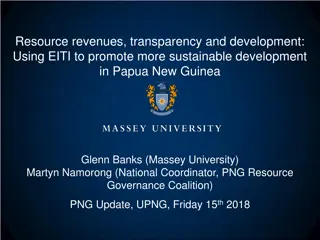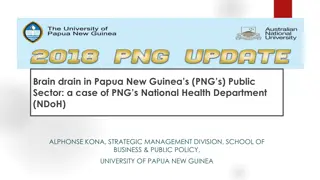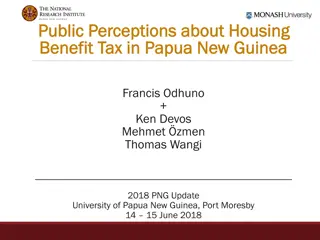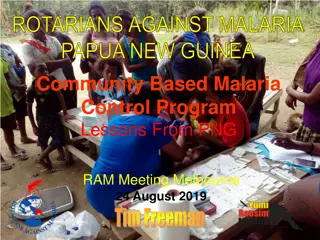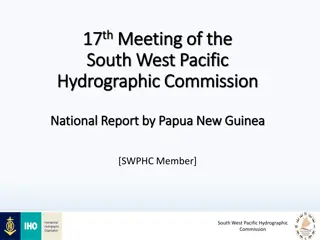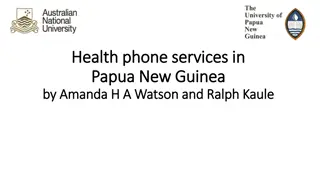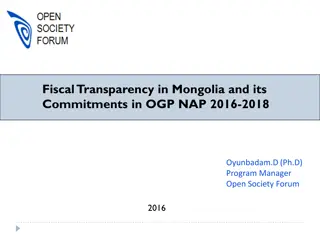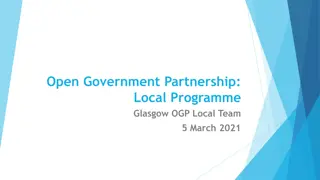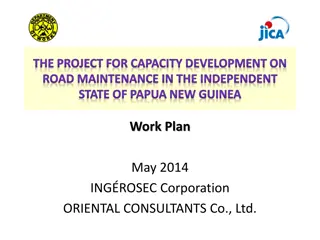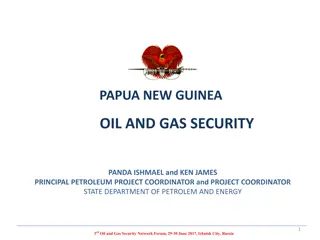Overview of Papua New Guinea's Fiscal Transparency Commitments in OGP
Papua New Guinea (PNG) is actively engaging in the Open Government Partnership (OGP), with commitments to enhance fiscal transparency and accountability. PNG's journey towards OGP membership includes workshops, seminars, and the submission of a National Action Plan emphasizing budget formulation processes. The country's progress reflects a dedication to open governance principles and collaboration with international partners like the IMF and World Bank.
Download Presentation

Please find below an Image/Link to download the presentation.
The content on the website is provided AS IS for your information and personal use only. It may not be sold, licensed, or shared on other websites without obtaining consent from the author.If you encounter any issues during the download, it is possible that the publisher has removed the file from their server.
You are allowed to download the files provided on this website for personal or commercial use, subject to the condition that they are used lawfully. All files are the property of their respective owners.
The content on the website is provided AS IS for your information and personal use only. It may not be sold, licensed, or shared on other websites without obtaining consent from the author.
E N D
Presentation Transcript
Fiscal Transparency Commitments in OGP s National Action Plans & GIFT General Stewards Meeting Washington D.C. June 20 - 21, 2016 P A U L B A R K E R & P E T E R M O N D O R O I N S T I T U T E O F N A T I O N A L A F F A I R S & D E P A R T M E N T O F T R E A S U R Y
Overview of Papua New Guinea Overview of Papua New Guinea Overview Key facts China: 6,268 km Japan: 4,771 km Area: 463,000 sq km Population: 7.3 million Capital: Port Moresby Currency: Kina (PGK) Indonesia Papua New Guinea Australia: 2,373 km Australia 2
Government of Papua New Guinea PNG is an independent Nation and got its independence from Australia in 1975. PNG is a Parliamentary Democracy with multi-party system. Prime Minister is the head of the Government. PNG is a member of the Commonwealth of Nations with Governor- General acting as head of State. Executive, Legislature and Judiciary are the three arms of Government. Constitutional safeguards include freedom of speech, press, worship, movement and association.
Status of PNGs Commitment to OGP & NAP OGP was launched on 20th September 2011 at the 66 United Nations General Assembly to provide an international platform for domestic reforms making the Governments more open, accountable and responsive to citizens. PNG s Minister for Foreign Affairs had expressed PNG s interest of joining the OGP during the OGP International Forum in Bali from 6 7 May 2014. NEC of PNG had endorsed for PNG to become an OGP member country and letter of intent expressing PNG s intention of attaining full membership to the OGP was conveyed to OGP Secretariat in Washington DC. OGP Co-chairs had endorsed PNG s full membership to the OGP as a partner.
PNGs Progress on the NAP Commitments Several OGP In-Country Workshops, seminars and conferences were conducted by the OGP Interim Steering Committee. Relevant Government Departments, Civil Society Organisations and Donor Development Partners including the IMF, World Bank & UNDP were involved. The PNG s first documented NAP will have been submitted to the OGP Secretariat in Washington D.C by 30th June 2016. 5
Implementing Fiscal Transparency and Implementing Fiscal Transparency and Accountability Initiatives in PNG Accountability Initiatives in PNG BUDGET FORMULATION: PNG Budget has two-staged budget process: 1st Stage - Departments of Treasury and National Planning informs the National Government Departments, CSA s and Sub-national Government s to submit their budget bids via a Budget Circular - to submit their budget bids for only new priorities as well as additional from their current funding levels which support Government priority policy areas. 2nd Stage Government Departments, CSA s & Sub-national Governments are given a funding limit or a ceiling to align their expenditures within through a budget circular in consistent within the agreed fiscal space. Taxation Policy Formulation Review of the Taxation System in 2015 is a good example of an accountable, transparent and a wider community consultation in formulating fiscal policy. Intention of two-staged budget process is to have Ministers responsible for Budgetary matters are engaged much earlier in the Budget decision making process and secure their input.
Fiscal Transparency and Accountability Fiscal Transparency and Accountability Initiatives in PNG Initiatives in PNG BUDGET IMPLEMENTATION, AUDITING & REPORTING Budget is implemented by the Departments, CSA s and the Sub-national Governments, however the Monitoring and Auditing are undertaken by the relevant Government Departments: Department of Treasury Monitors and reports the performance of the Budget in the course of the year. Department of National Planning - Appraises and Monitors the implementation of the Development Budget (comprising especially the capital budget). Office of the Auditor General Audits the outcome of the Budgets and report it to the Parliament and the Public a required first step to become public document.
Progress on other Fiscal Transparency & Progress on other Fiscal Transparency & Accountability Initiatives & Constraints Accountability Initiatives & Constraints Examples of Fiscal Transparency and Accountability Measures implemented in adherence to Fiscal Responsibility Act: Department of Treasury in adherence to the Fiscal Responsibility Act: Pre-Budget Statement Budget Strategy Paper 1st July Mid-Year Report Mid-Year Economic and Fiscal Outturn Report 31st July Final Budget Outturn Report 31st March Publication of Tax Expenditures Report in Economic Policy Document of the Budget Production of Monthly Fiscal Outturn Reports (untimely availability of data from IFMS) NEFC monitors and prepares quarterly report on the use of grants transferred by the National Government to the Sub-national government. Department of National Planning Not effective in monitoring implementation of Development Budget. Recently has shifted role from releasing funds to oversight in recent years. Office of the Auditor General not preparing and reporting Audited reports on a timely manner. Problems: (1) funding and staffing for AG to prepare accounts, (2) need firm direction timely submission of audited accounts (penalty provision), (3) AG receives report from DoF
Progress on implementing other Fiscal Progress on implementing other Fiscal Transparency and Accountability Transparency and Accountability Initiatives in PNG & Constraints Initiatives in PNG & Constraints Rolling out of the Government Finance Management System (IFMS) replacing PGAS system & Oracle system: Objective is to produce a single unified chart of accounts and budget classification across all departments and sub-national governments. Yet to be rolled out to other Government Departments and Sub-national governments. Currently facing difficulties in production of timely & complete sets of accounts. Department of Treasury has started to implement the 2014 Government Finance Statistics System (GFS) in its Economic Policy Document of the National Budget in the 2016 Budget. Needs to configure the IFMS system. Public Finance Management Reform strengthening the Government procurement system. Public Finance Management Reform Integration of all Government Payment system Revenue (RASI), Customs (SIGTAS), Finance and Treasury (IFMS) and BPNG (?? Payment system).
PNG Extractive Industry Transparency PNG Extractive Industry Transparency Initiative (EITI) Initiative (EITI) Objectives of implementing EITI in PNG Improve public understanding of the management of the extractive industries Improve accountability of revenue and payment from Government and Industry respectively Update Government endorsed EITI implementation on March 2013 PNG signed up to EITI on March 2014 First PNGEITI Report produced on 19th March 2016 Commitment Government is committed to implementing EITI with support from the Industry and Civil Society Organisations
Constraints to Wider Public Participation Constraints to Wider Public Participation in the Formulation of Fiscal Policy in the Formulation of Fiscal Policy Majority of the PNG population are farmers in the rural areas difficult to disseminate information and get feedback. Significant level of funding goes to the districts in the form of grants where planning and accountability is the weakest. Some process exists notably CIMC system but this only goes so far as funding constraint. Recent Developments as a result of introducing competition in the telecommunication sector an increase in the use of the telephones corresponding increase in comments and debates on the Budget and public policy matters. Government should institutionalise systems and process for a fiscal policy formulation involving wide PNG.
